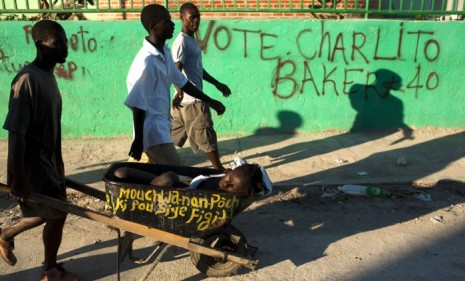Haiti's escalating cholera outbreak
The disease, aided by post-earthquake sanitation problems, is spreading, and the death toll is rising. How bad will it get?

A free daily email with the biggest news stories of the day – and the best features from TheWeek.com
You are now subscribed
Your newsletter sign-up was successful
Public anger over Haiti's cholera outbreak erupted this week as protesters clashed with United Nations soldiers in Cap Haitien, the Caribbean nation's second largest city. One person was reportedly killed when soldiers fired on people throwing rocks and bottles. (Watch an AP report about Haiti's riots.) Health officials reported that the disease has spread to the capital, Port-au-Prince, where they fear it could spread quickly in slums and in camps teeming with people left homeless by January's devastating earthquake. Nearly 1,000 Haitians have already been killed by the disease. How bad will the outbreak get? Here, a quick guide:
How quickly is cholera spreading in Haiti?
Nearly 15,000 people have been hospitalized with cholera-like symptoms. Doctors fear the infection rate could rise quickly now that the outbreak has reached the crowded capital city of Port-au-Prince, where a million people who were left homeless by the January earthquake are living in poor sanitary conditions that could help the disease spread. "All of the hospitals in Port-au-Prince are overflowing with patients," says Stefano Zannini, head of Doctors Without Borders in Haiti.
The Week
Escape your echo chamber. Get the facts behind the news, plus analysis from multiple perspectives.

Sign up for The Week's Free Newsletters
From our morning news briefing to a weekly Good News Newsletter, get the best of The Week delivered directly to your inbox.
From our morning news briefing to a weekly Good News Newsletter, get the best of The Week delivered directly to your inbox.
Why are protesters fighting with the U.N.?
Many of the demonstrators believe U.N. soldiers from Nepal brought the disease into the country. The strain of cholera spreading through Haiti resembles one that originated in Asia, although it has been circulating around the globe for decades. AP journalists reported seeing waste from a Nepalese military camp being dumped into a river in central Haiti, one of the first areas where the disease was reported. But U.N. officials say none of the soldiers there have been infected, and the Haitian health ministry found no evidence of cholera at their camp.
Is there any way to stop the outbreak?
Yes — better sanitation and clean water will help. The U.N. is hoping to raise $164 million to fight the disease, more than half of which would go toward improving water, sanitation, and hygiene. The U.S. is sending 2 million doses of oral rehydration solution to help sick people recover. And since cholera is caused by bacteria spread in contaminated water or food, a simple bar of soap can provide some defense. In Haiti, where a cake of local soap costs 50 cents and the average person lives on less than $1.25 a day, many people can't afford to buy it, so foreign aid groups are rushing to distribute hundreds of thousands of soap bars. And sick people can be easily treated with antibiotics; the challenge is getting enough doses to remote mountain areas.
A free daily email with the biggest news stories of the day – and the best features from TheWeek.com
How bad will it get?
Now that the bacteria is in Haiti's water supply, experts say it will be around for years. The U.N. estimates that 270,000 Haitians could be hit with cholera symptoms, which can cause leg cramps, and profuse diarrhea and vomiting that can lead to dehydration and death. That could mean thousands more will die: An outbreak that started in Zimbabwe two years ago has stricken 99,000 people, and killed 4,000. And the Pan American Health Organization forecasts that up to 1 million could be infected in Haiti asymptomatically. "It is spreading," says U.N. Humanitarian Coordinator Nigel Fisher, "and we have to contain, if not [the] number of cases... the number of deaths."
-
 Why is the Trump administration talking about ‘Western civilization’?
Why is the Trump administration talking about ‘Western civilization’?Talking Points Rubio says Europe, US bonded by religion and ancestry
-
 Quentin Deranque: a student’s death energizes the French far right
Quentin Deranque: a student’s death energizes the French far rightIN THE SPOTLIGHT Reactions to the violent killing of an ultraconservative activist offer a glimpse at the culture wars roiling France ahead of next year’s elections
-
 Secured vs. unsecured loans: how do they differ and which is better?
Secured vs. unsecured loans: how do they differ and which is better?the explainer They are distinguished by the level of risk and the inclusion of collateral